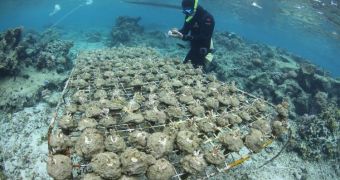Until now, marine biologists had no idea that diseases can be transmitted from humans to corals, yet this is precisely what they discovered during a recent investigation. The finding is of tremendous importance for coral conservation efforts.
A large portion of all corals in the world are simply dying off, or are severely endangered, primarily due to global warming, oceanic acidification, and the shifting range of certain marine species. As such, any type of information that may prevent this from happening is critical.
Rollins College biology professor Kathryn Sutherland, an expert in the study of bright orange Elkhorn corals, was the leader of the new investigation, which was carried out using funds provided by the US National Science Foundation (NSF).
She and her team were able to discover that Elkhorn corals living off the coasts of Florida were being decimated by a disease that apparently originated in humans. This is the first time such an occurrence has been observed, and the implications are tremendous.
“The corals themselves provide three-dimensional structure for the reef, and then the fish and invertebrates inhabit the reef. These coral reefs provide protection and food for these other organisms,” Sutherland explains.
The expert adds that the disease is called White pox. It primarily manifests itself through slowing the overall growth of the corals, while at the same time leading to the production of white patches that spread out throughout the colony. The pathogen Serratia marcescens is the cause of the infection.
Experts classified this condition as a reverse zoonosis, meaning that it moves from humans to animals. Some of the most renown zoonotic conditions include HIV, the avian flu and swine flu. “This is the first example of a human pathogen infecting a marine organism,” the team explains.
S. marcescens is a known byproduct of human waste. The fact that it was seeping into the world's oceans was made obvious as far back as 2002, but researchers could not establish a link between this contamination and coral death at the time.
“If we continue to harm the oceans and the reefs, we're harming ourselves in the long run. If we harm the reefs, those food webs that are dependent or interlocking with the reefs will be disrupted and they're so complex it's hard to say what will happen, but it definitely won't be good,” Hunter Noren explains.
He is a marine biology student at the Rollins College, and also a member of the team that conducted the new investigation.

 14 DAY TRIAL //
14 DAY TRIAL //